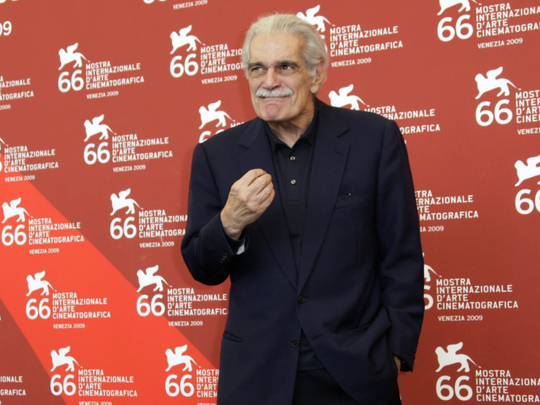
The most famous Arab actor in Hollywood, Omar Sharif, won global renown with his intense performance in David Lean’s epic Lawrence of Arabia, but then went on to essay roles as diverse as that of iconic Soviet and Latin American revolutionaries, a German army officer, Genghis Khan, a Russian Tsar, a Pathan horseman and even an Indian Brigadier.
The varied roles of Sharif, whose 85th birth anniversary is on April 10, seem to mirror his unique life — a Christian who converted to Islam for love, an Egyptian actor whose international career was made possible by a Jewish filmmaker from Hollywood, a champion player of contract bridge, writer of regular syndicated column and several books on the game, and among those who advised George W. Bush against invading Iraq.
Born Michel Demetri Chalhoub on April 10, 1932, in a Catholic family of Lebanese and Syrian descent, Sharif, after a spell in his father’s lumber business, decided to make his career in films.
He was going to London to study in the Royal Academy of Dramatic Arts, when offered a starring role in Egyptian film Sira Fi Al Wadi (The Blazing Sun, 1954) opposite Faten Hamama. Falling in love with her, he converted to marry her and they had one son together, Tarek. They amicably divorced in 1974 due to Sharif’s self-exile in Europe.
Sharif had notched more than 20 films before he was cast in Lawrence of Arabia (1962), with producer Sam Spiegel and Lean choosing him over a better known French actor. Sharif himself recalled that he was chosen because “I spoke English, had black hair, black eyes and a moustache. It was all luck.”
As Sherif Ali, who silently glides from the dunes early in the movie and kills Lawrence’s guide for drinking from his well before taunting him “Have you no fear, English?”, he more than held his own against the cast which included Peter O’Toole as Lawrence, Alec Guinness as Prince Feisal, Anthony Quinn as Auda, Claude Rains as Dryden and Jack Hawkins as Gen. Allenby.
Interestingly, Sherif Ali’s role is said to have been initially offered to Dilip Kumar, who declined, while Sharif was slated for the bit role of the dead guide. Sharif became close friends with O’Toole, who refused to believe that anyone could be “possibly be called Omar Sharif” and nicknamed him “Cairo Fred”.
Sharif, who was included in the film’s publicity campaign at Spiegel’s insistence, impressed journalists with his charm. He was nominated for the Oscars but didn’t win.
Spiegel, who offered Sharif a seven-film contract though at a lesser amount, however did him a big favour by securing him an “exit visa”, which were then tightly controlled in Egypt.
His most famous work was as the title role of the tormented poet in Lean’s 1965 adaptation of Boris Pasternak’s Doctor Zhivago, opposite Julie Christie as Larissa “Lara” Antipova. His son played the young Yuri Zhivago. He again did not win any of the five Oscars the film garnered for its epic cinematography and haunting music.
Other major roles of Sharif, who spoke English, Arabic, French, Italian, Spanish and Greek and seemed comfortable in any cultural and historic setting, included iconic revolutionary Che Guevara in Che (though it turned out the film was funded by the CIA), a German officer trying to trace a psychopathic top officer in The Night of the Generals, villain Colorado in western treasure hunt Mackenna’s Gold starring Gregory Peck, and a Soviet spy in Cold War drama The Tamarind Seed, opposite Julie Andrews.
On TV, he play the role of doomed Czar Nicholas II in mini series Anastasi, as well as of Khuda Daad in a TV adaptation of M.M. Kaye’s The Far Pavillions.
However, his gambling habit cost him all his fortune which led the actor to seek many forgettable movies to earn for his family — hence his uncredited cameo as an Indian Brigadier in the super-flop Inchon (1981).
Diagnosed with Alzheimer’s disease in 2012, he succumbed to a heart attack in a Cairo hospital on July 10, 2015. He died less than six months after the death of his ex-wife, Hamama, besides whom, he always said, he never loved any woman.









